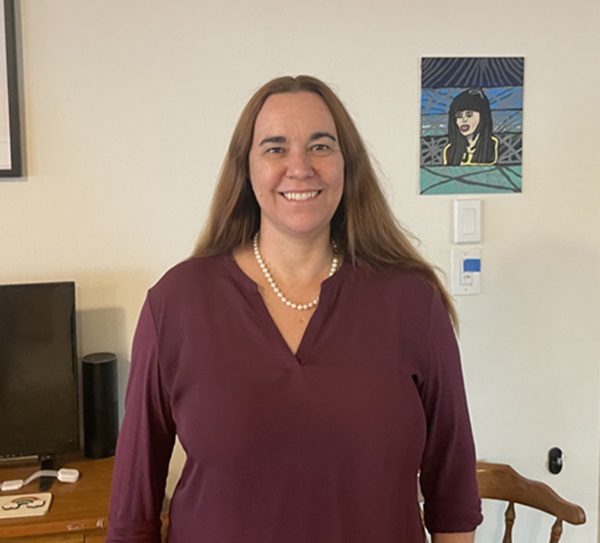by Kim Lamb Gregory
 Chair of Political Science, Global Studies and Public Administration Dana Lee Baker’s
keen interest in public policy arose from both her academic curiosity and personal
experience. As the director of CSU Channel Island (CSUCI)’s new Master of Public Administration
(MPA), Baker is thrilled to be working with students interested in the continuum of
public policy that ranges from detecting a social need to effecting change.
Chair of Political Science, Global Studies and Public Administration Dana Lee Baker’s
keen interest in public policy arose from both her academic curiosity and personal
experience. As the director of CSU Channel Island (CSUCI)’s new Master of Public Administration
(MPA), Baker is thrilled to be working with students interested in the continuum of
public policy that ranges from detecting a social need to effecting change.
“I wanted to go into public policy because I’ve always had an interest in human rights and civil rights, especially as they relate to neurodiversity and disability,” she said.
Baker began teaching the University’s first Public Administration classes in Fall of 2024, along with program faculty members Scott Frisch and Nancy Pement.
Baker’s interest in public policy began at home, when she was growing up with a brother and one sister in the city of Edmonton in Alberta, Canada. Another brother came along after the family moved to California in the 1990s. Her mom taught adults English and her dad was an organic chemist and expert in blood safety in the late 1980s. He worked on the science linked to blood product safety and HIV, so Baker was aware of how politics and policy affected those in need of care.
“I also had a sibling with cancer who died in the ‘90s,” she said. “I just remember when he was trying to do his schoolwork from his hospital bed.”
Baker also had a brother on the autism spectrum, so she had an intense interest in public policy for the most vulnerable in society. When she came to California to earn her Master of Public Policy at the University of Southern California (USC), she did an internship with the Alliance for Children’s Rights and “it opened up my eyes to the scope of disability policy and public administration.”
Through her work with the Alliance for Children’s Rights, she saw different foster care situations in need of better public policy, and, besides becoming a parent to two daughters and a son, she also became a foster parent to 16 children.
Baker served on the faculties at Washington State University and the University of Missouri-Columbia and went on to earn a Ph.D. in Public Policy at the University of Texas at Austin. Among her areas of study were economics, public financial management, disability studies and something known as trauma-informed community response
“A trauma-informed response is when you don’t automatically vilify someone who is behaving undesirably,” she said. “A trauma-informed response involves working with people more rather than simply reacting. You don’t make excuses, but you seek explanations for the behavior and develop a path forward.”
Baker has a keen interest in neurodiversity, which describes the different ways people’s brains process information and the different ways their nervous systems respond, resulting in different behaviors and learning styles.
In 2011, Baker published a book entitled “The Politics of Neurodiversity: Why Public Policy Matters” (Lynne Rienner Publishers).
The book explores the many ways society can respond to human neurodiversity from ensuring their civil right to providing medical care to celebrating disability culture.
“We have a long tradition in Western society of responding to neurodivergence by treating people as if they were subhuman or monsters,” Baker said.
Baker was eager to join CSUCI in 2017, where she was able to combine her academic interests and experience to help shape the new MPA. Baker looks forward to the first class of MPAs to graduate from CSUCI, and to the wealth of choices that will be available to them.
“You can do almost anything in the public sector or not-for-profit organizations who work with public money,” Baker said. “There are quite a few positions in the private sector who need someone who knows how to work with government policy—anything where we are taking public money and making that work is public administration.”
